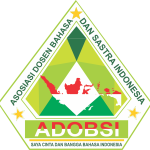MODERNIZING OF JAVANESE WOMEN DRESSING STYLE CULTURE IN 20TH CENTURY: THE EDUCATION IMPACT
Abstract
The Dutch colonialism not only leaves stories about exploitation, the breakdown of social strata, and other inhumane stories. On the other hand, the presence of Dutch colonialism in Nusantara gives the influence of modern culture to several aspects of bumiputra people's lives. After the colonization runs for centuries in Nusantara, the colonial government seems to have the awareness for"return the favor" to the bumiputra people by implement the Ethical Policy that are aimed at improving the welfare of bumiputra people. After the enactment of Ethical Policy, Javanesse people get into the modernization, one of them in the education aspect. After receiving the western education models, Javanese women began more often wearing the western dressing style. This article try to explain the women history in the appearance style aspects as the one of implementation education impacts by the colonial government for the bumiputra people.
Keywords
Full Text:
PDFReferences
Afandi, A. N., Swastika, A. I., & Evendi, E. Y. (2020). Pendidikan pada masa pemerintah kolonial di hindia belanda tahun 1900-1930. Jurnal Artefak, 7(1), 21. DOI: https://doi.org/10.25157/ja.v7i1.3038
Aritonang, J. S., & Steenbrink, K. A. (Ed.). (2008). A history of christianity in Indonesia. Leiden: Brill.
Coté, J. (1995). Imperialism and the progressive education movement: schooling in colonial Sulawesi. Paedagogica Historica, 31(1), 253–277.
Dewi, K. H. (2012). Javanese Women and Islam: identity formation since the twentieth century. Southeast Asian Studies, 1(1), 109–140.
Fakhriansyah, M., & Patoni, I. R. P. (2019). Akses Pendidikan bagi pribumi pada periode etis (1901-1930). Jurnal Pendidikan Sejarah, 8(2), 122–147.
Freire, P. (1998). Pedagogy of freedom: ethics, democracy, and civic courage. Lanham: Rowman & Littlefield Publishers.
Houben, V. J. H. (2002). Keraton dan kompeni: Surakarta dan Yogyakarta 1830-1870. Yogyakarta: Bentang Budaya.
Ingelson, J. (2018). Mahasiswa, nasionalisme & penjara: perhimpunan Indonesia 1923-1928. Depok: Komunitas Bambu.
Kamphuis, K. (2018). Giving for girls: reconsidering colonial civilizing missions in the Dutch East Indies through charitable girls’ education. New Global Stud, 12(2), 217–234.
Kartodirdjo, S. (1991). Modern Indonesia: tradition and transformation; a sociohistorical perspective. Yogyakarta: Gadjah Mada University Press.
Kat Angelino, A. D. A. de. (1931). Colonial policy: volume II The Ducth East Indies. Springer: Netherlands. https://doi.org/10.1007/978-94-011-8904-0
Klaveren, J. J. (1983). The Dutch colonial system in the East Indies. Springer: Netherlands. DOI: https://doi.org/10.1007/978-94-011-8904-0
Lee, T. (2016). Defining the aesthetics of the Nyonyas’ Batik Sarongs in the Straits Settlements, Late Nineteenth to Early Twentieth Century. Asian Studies Review, 40(2), 173–191.
Maas, P., & Steenbrink, K. (Ed.). (2007). Catholics in Indonesia, 1808-1942. Vol. 2: The spectacular Growth of a Self-Confident Minority 1903—1942 (Vol. 2). Brill Academic Pub.
Margana, S., & Nursam, M. (ed). (2010). Kota-kota di Jawa: identitas, gaya hidup dan permasalahannya.Yogyakarta: Ombak.
Nordholt, H. S. (2011). Modernity and cultural citizenship in the Netherlands Indies: an illustrated hypothesis. Journal of Southeast Asian Studies, 42(3), 435–457.
Nurhajarini, D. R. (2003). Perkembangan gaya pakaian perempuan Jawa di Kota Yogyakarta pada awal abad XX sampai akhir masa kolonial [Tesis Tidak Diterbitkan]. Universitas Gadjah Mada.
Poesponegoro, & Notosusanto, N. (2010). Sejarah nasional Indonesia jilid V. Jakarta: Balai Pustaka.
Pols, H. (2018). Nurturing Indonesia: Medicine and Decolonisation in the Dutch East Indies. Cambridge: Cambridge University Press.
Prayudi, G. M., & Salindri, D. (2015). Pendidikan pada masa pemerintahan Kolonial Belanda di Surabaya tahun 1901-1942. Publika Budaya, 1(3), 20–34.
Ricklefs, M. C. (2007). Sejarah Indonesia modern. Jakarta: Serambi Ilmu.
Ridho’i, R. (2018). Melihat motif pendidikan di nusantara dari perspektif historis. Jurnal Pendidikan Sejarah Indonesia, 1(2), 135–149.
Roskies, D. M. E. (1988). Race and class in colonial writing: instances from the Dutch East Indies. Dutch Crossing, 12(34), 15–39.
Rottier, Ch. J. M. (1943). The teaching of English in Holland and the Dutch East Indies. Quarterly Journal of Speech, 29(3), 329–334. DOI: https://doi.org/10.1080/00335634309380900
Sajed, A. (2017). Peripheral modernity and anti-colonial nationalism in Java: economies of race and gender in the constitution of the Indonesian National Teleology. Third World Quarterly, 38(2), 505–523.
Soekiman, D. (2011). Kebudayaan Indis; dari zaman kompeni sampai revolusi. Depok: Komunitas Bambu.
Soemardjan, S. (2009). Perubahan sosial di Yogyakarta. Depok: Komunitas Bambu.
Taylor, J. G. (2009). The social world of Batavia: Europeans and Eurasians in Kolonial Indonesia (2nd ed). Madison: University of Wisconsin Press.
Vickers, A. (2005). A history of modern Indonesia. Cambridge: Cambridge University Press.
Vlekke, B. H. M. (2008). Nusantara: sejarah Indonesia. Jakarta: Kepustakaan Populer Gramedia.
Wiharyanto, A. K. (2006). Sejarah Indonesia madya abad XVI-XIX (Cet. 1). Yogyakarta: Universitas Sanata Dharma.
Zainu’ddin, A. (1970). Education in the Netherlands East Indies and the republic of Indonesia. Melbourne Studies in Education, 12(1), 17–82.
Refbacks
- There are currently no refbacks.






